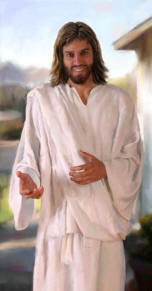A picture of our faith.
There is a saying that states that “one picture is worth a thousand words”. How true that is on so many occasions. I first heard about the Bali explosions on the radio. The news reporter attempted to give a verbal description of what had happened and the devastation that had occurred in that otherwise peaceful and fun-loving place. However, it wasn’t until I turned on the TV and saw the pictures of the destruction, the stretchers and ambulances, the overcrowded hospital that the full extent of the situation really hit home. Those pictures described what thousands of words weren’t able to do.
A couple of years when another driver attempted to remodel the look of my car by driving into while making a u-turn, I filled out a form for the insurance company. Included in this form was a space to explain what happened in words and another space to draw a diagram of what happened in the accident. The insurance company realised that often it is easier to draw a picture of what happened.
Companies and churches have logos and if they are good logos they tell you something in picture form about that organisation. The Lutheran Church of Australia has a logo. On it you will see a large gold cross, the Southern Cross and flames of fire – that tells you something about the LCA – the centrality of the cross of Christ, the Spirit at work through the church and the location of the LCA.
There is another symbol that is found in Lutheran Churches throughout the world. You will find this symbol on the front of church buildings and halls, you will find it included in the designs of the magnificent stain glass windows of Lutheran churches all over the place (including St Luke’s). You will find it in books and printed materials that are distinctly Lutheran in origin. I am talking about Luther’s Rose. Luther devised this logo as a summary of his faith. But not only of his faith but also that of all Christians. And so this logo is displayed in our churches as a picture of the Christian faith. You might say it is a sermon in picture form. Since today’s service is dedicated to commemorating the Reformation, it’s worth looking at it because it is a picture that will take a thousand words to describe this summary of our faith. Let’s start.
At the centre of Luther’s logo is a cross. The cross of Jesus is at the every centre of the Christian faith. Without the cross, there is no Christianity.
This cross is black in colour. Black is the colour of sin and evil – the darkness in our hearts and in the world that causes so much grief and pain. John’s Gospel says, “People love the darkness rather than the light, because their deeds are evil” (John 3:19). Black reminds us of our sinfulness. “Everyone has sinned and is far away from God’s saving presence” (Rom 3:23), the apostle Paul reminds us. Black is the colour of death – sin leads to death.
When Luther was a young man he was nearly killed and the thought of dying terrified him. He was not ready to meet God the eternal Judge. And so he left all of his friends, his well paid job, his family, and wealth in his search of a way to get rid of his sin and be right with God. He entered a monastery and prayed, and fasted, and studied, constantly. But still his heart did not feel at peace with God. He always felt too sinful to ever be called into the presence of God if he were to suddenly die. He never felt confident that he would go to heaven. So he prayed, and studied, and fasted more.
But the more he studied, the more he prayed, the more questions he had and the more doubts he had about how worthy he was before God. His sin and God’s judgement terrified him.
It was fortunate for Luther that he was studying the Letter to the Romans and gained a fresh insight into 1:17: The righteous shall live by faith. He realised that a person cannot be made right with God by trying to impress God. Salvation is a gift of faith from God – faith that believes and trusts in what Jesus has done for him. Salvation is freely available to all.
This was the answer to Luther’s searching and praying. He was elated. You cannot be saved without Jesus Christ. You cannot by pass the cross. Our sin is so great that it permeates and infiltrates every part of us, including every thing we say, do and think. It is impossible for us to step aside from our sinfulness for just one moment, and save ourselves, or dedicate ourselves to God, or give ourselves to God. Without God’s intervention, we would have no hope.
And so at the centre of Luther’s Symbol is the cross. The cross is the symbol of God’s acceptance, his forgiveness, his grace. Yes, we are sinners, but by the free gift of God’s grace all are put right with him through Christ Jesus, who sets us free (Rom 3:23). Through faith in Jesus, our sins are forgiven, we are accepted by God, we are welcomed by our loving heavenly Father.
In Luther’s logo the cross is placed on a red heart. Even though the cross is black, a symbol of sin and death and the shame that the Son of God had to die in such a terrible way because of our sin, the heart is red because it is a living heart. The gospel of forgiveness gives life. We have been saved, given life as children of his family, recreated, reborn, given a new heart to live as God wants us to live.
The heart is a symbol of love. Not only the love that God showed in sending his Son, but for the love that flows through us. We have been renewed to love God with all our heart, soul, and mind, and to love our neighbour as we love ourselves. The red heart indicates that since we are God’s children through Jesus death on the cross, this has an effect on the way we live our lives. As God’s people, we should turn away from everything that is evil and sinful and let God’s love be evident in everything we say and do. Paul says, “You are the people of God…. So then, you must clothe yourselves with compassion, kindness, humility, gentleness, and patience. Be tolerant with one another and forgive one another …just as the Lord has forgiven you. And to all these qualities add love, which binds all things together in perfect unity (Colossians 3:12-14).
A heart filled with God’s love is a busy, active heart. There is no room for complacency or laziness. Nobody receives the grace of God for private enjoyment. Nobody receives the gifts of God for private enjoyment. They are meant to be used to serve others.
The red heart is resting on a white rose. The white rose has been connected with the coming of the Messiah. The Christmas carol: Behold, a Rose is growing of loveliest form and grace, etc. The rose is the flower that indicates joy in the midst of the thorns of life.
And so the red heart and living the Christian life rests on the white rose. It is not easy being a Christian, a follower of Jesus in this day and age.
It is easy to be sidetracked,
it is easy to follow the crowd,
it is easy to forget that we have been called by God to be in his family and to do his work. We fail often, we confess that we have not done what God has called us to do. That is part of the thorny world in which we live.
But we experience the joy of the Good News of the Gospel, the joy of being renewed for service, and refreshed with sins forgiven and sent out again to do his work. For Luther, the rose was a symbol of this joy among the thorns of our world.
Because of the joy of knowing Jesus, our service to others is filled with joy. If we served our Lord grudgingly, it would not be service. If we went unwillingly, or with a grumbling spirit, our service would not be worth anything. True service, true worship, true discipleship reflects the joy that we have because of Christ.
What a joy to have a Saviour who loves us!
What a joy to know that our sins are forgiven!
What a joy to know that Jesus gives eternal life!
What a joy it is to be called as Jesus’ disciples in this world to pass on that love and hope of eternal life!
Everything about Jesus fills our hearts with joy. As Paul said: Rejoice in the Lord always. I will say it again: Rejoice!
The white rose rests on a sky blue background. The sky-blue background of Luther’s logo reminds us of the promise of eternal life that we have through Jesus Christ. Because Jesus rose from the grave, we too shall share in the bliss of heavenly joy and we look forward to that day when we will be in heaven with our Lord and with all those faithful people who have gone before us. It may happen that our life takes a turn for the worst – persecution for our faith, tragedy, ill health, crippling old age, the loss of our ability to think clearly – but there is one thing that doesn’t change or decay. We look forward to entering heaven when this life is over.
The sky-blue background reminds us that our life on this earth is for only a short time. We are here and then we pass away – not into nothingness or oblivion – but into the joy of eternal life.
Around the whole logo is a gold ring around. Like a ring that has no end, likewise the joy of heaven has no end, it will go on into eternity. The ring is gold, one of the most precious metals, and so indicating that the promise of eternal life is the most precious of all. In fact, you might say, everything relating to our faith is precious like gold and we value it more highly than anything else in all the world.
So there you have Luther’s Rose; a pictorial summary of the Christian faith. It is a symbol of a faith that is just as true and relevant today as it was in Luther’s time.
The logo not only gives us an understanding of our faith but challenges us to ask:
How central is the Jesus in your life or is he somewhere around the edges?
How readily have you accepted that Jesus has cleansed you from all your sin or do hang on to your guilt?
How ready are you to give up your pet sins and obediently live as someone who belongs to God?
How willing are you serve Christ through humbly serving others?
How well are you sharing the joy of the gospel with others?
How strong is your relationship with your Saviour – or is it a somewhat casual affair?
How confident are you that when you die, you will go to heaven? Or is there some lingering doubt that you won’t be good enough?
In what ways are you letting the love of Christ effect every relationship?
Look at Luther’s logo again and see that Jesus, God’s love, a renewed heart and Christian service are central to everything that we do personally and as a church.
Confess it, believe it and live it!!



